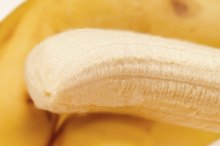What does fact checked mean?
At Healthfully, we strive to deliver objective content that is accurate and up-to-date. Our team periodically reviews articles in order to ensure content quality. The sources cited below consist of evidence from peer-reviewed journals, prominent medical organizations, academic associations, and government data.
The information contained on this site is for informational purposes only, and should not be used as a substitute for the advice of a professional health care provider. Please check with the appropriate physician regarding health questions and concerns. Although we strive to deliver accurate and up-to-date information, no guarantee to that effect is made.
Do Blueberries Have Potassium?
Every time you eat fruit, chances are you’re getting significant amounts of vitamin C, dietary fiber and potassium. Most varieties are rich in at least one – if not all three – of these important nutrients. While blueberries are no exception – they’re a good source of fiber, an excellent source of vitamin C and contain high levels of antioxidant compounds – they won’t give your potassium intake much of a boost.
Potassium Content
You’ll get about 130 milligrams of potassium from a 1-cup serving of fresh blueberries, according to the American Dietetic Association. For a food to qualify as a good source of potassium, it must provide at least 10 percent of the recommended daily value – or about 350 milligrams – per serving. Foods that deliver at least 20 percent of the daily value for potassium per serving – or around 700 milligrams – are viewed as excellent sources. Blueberries are considered a low-potassium food because they supply just 4 percent of the recommended daily value per serving.
- You’ll get about 130 milligrams of potassium from a 1-cup serving of fresh blueberries, according to the American Dietetic Association.
- Foods that deliver at least 20 percent of the daily value for potassium per serving – or around 700 milligrams – are viewed as excellent sources.
Daily Intake
What Is the Potassium Content in a Banana?
Learn More
Potassium is an electrolyte that works closely with sodium to keep fluids and minerals balanced throughout your body. Sodium is primarily found outside cell walls, whereas potassium carries out most of its work from inside your cells. Getting enough potassium helps counteract the effects of sodium, reduce high blood pressure, protect against kidney stones and minimize bone loss. According to the Institute of Medicine of the National Academies, most healthy adults should get at least 4,700 milligrams of potassium a day 3. If you take certain medications or have kidney problems, however, you may need less.
- Potassium is an electrolyte that works closely with sodium to keep fluids and minerals balanced throughout your body.
- According to the Institute of Medicine of the National Academies, most healthy adults should get at least 4,700 milligrams of potassium a day 3.
Select Comparison
Although most berries are higher in potassium than blueberries, very few varieties are good sources of the nutrient. Cranberries are the only common berry that contain less potassium – about 70 milligrams per cup – than blueberries, according to the book “Wellness Foods A to Z: An Indispensable Guide for Health-Conscious Food Lovers.” Red raspberries provide about 190 milligrams of potassium per cup, making them comparable to blueberries 4. A cup of strawberries has closer to 250 milligrams of potassium, while you’ll get right around 300 milligrams from a serving of blackberries, gooseberries or currants. With just over 400 milligrams per cup, elderberries qualify as a good source of potassium.
- Although most berries are higher in potassium than blueberries, very few varieties are good sources of the nutrient.
- A cup of strawberries has closer to 250 milligrams of potassium, while you’ll get right around 300 milligrams from a serving of blackberries, gooseberries or currants.
Considerations
How Much Potassium Is in Bitter Gourd?
Learn More
If you’re specifically trying to boost your potassium intake, you’d be better off eating raisins, prunes, apricots, oranges, papaya, kiwifruit, cantaloupe or bananas. One average-size banana has about three times more potassium than a cup of blueberries. Eating blueberries does have its benefits, though. They’re relatively low in calories and sugar compared to most fruit – a 1-cup serving provides just 80 calories and 15 grams of sugar. They also supply about 4 grams of fiber and right around 20 percent each of the daily values for vitamins C and E. Unusually high flavonoid levels help make blueberries one of the best sources of antioxidants available.
- If you’re specifically trying to boost your potassium intake, you’d be better off eating raisins, prunes, apricots, oranges, papaya, kiwifruit, cantaloupe or bananas.
- They also supply about 4 grams of fiber and right around 20 percent each of the daily values for vitamins C and E. Unusually high flavonoid levels help make blueberries one of the best sources of antioxidants available.
Related Articles
References
- Linus Pauling Institute at Oregon State University: Potassium
- NYU Langone Medical Center: Potassium Content of Foods
- Wellness Foods A to Z: An Indispensable Guide for Health-Conscious Food Lovers; Sheldon Margen, M.D.
- American Dietetic Association Complete Food and Nutrition Guide; Roberta Larson Duyff, M.S., R.D.
- Potassium. Office of Dietary Supplements. National Institutes of Health
- Lambert H, Frassetto L, Moore JB, et al. The effect of supplementation with alkaline potassium salts on bone metabolism: a meta-analysis. Osteoporos Int. 2015;26(4):1311-8. doi:+10.1007/s00198-014-3006-9
- Chatterjee R, Slentz C, Davenport CA, et al. Effects of potassium supplements on glucose metabolism in African Americans with prediabetes: a pilot trial. Am J Clin Nutr. 2017;106(6):1431-1438. doi:10.3945/ajcn.117.161570
- Potassium. Fact Sheet for Consumers. Office of Dietary Supplements. National Institutes of Health
- Health Claim Notification for Potassium Containing Foods. US Food and Drug Administration
- Aburto NJ, Hanson S, Gutierrez H, Hooper L, Elliott P, Cappuccio FP. Effect of increased potassium intake on cardiovascular risk factors and disease: systematic review and meta-analyses. BMJ 2013;346:f1378.
- Academy of Nutrition and Dietetics. What Is Potassium?
- ConsumerLab.com. Potassium Supplements Review.
- Curhan GC, Willett WC, Rimm EB, Stampfer MJ. A prospective study of dietary calcium and other nutrients and the risk of symptomatic kidney stones. N Engl J Med 1993;328:833-8.
- Curhan GC, Willett WC, Speizer FE, Spiegelman D, Stampfer MJ. Comparison of dietary calcium with supplemental calcium and other nutrients as factors affecting the risk for kidney stones in women. Ann Intern Med 1997;126:497-504.
- D’Elia L, Barba G, Cappuccio FP, Strazzullo P. Potassium intake, stroke, and cardiovascular disease a meta-analysis of prospective studies. J Am Coll Cardiol 2011;57:1210-9.
- O’Neil C, Keast D, Fulgoni V, and Nicklas T. Food sources of energy and nutrients among adults in the US: NHANES 2003-2006. Nutrients. 2012;4:2097-120. DOI: 10.3390/nu4122097.
- Stone M, Martyn L, and Weaver C. Potassium intake, bioavailability, hypertension, and glucose control. Nutrients. 2016;8: E444. DOI: 10.3390/nu8070444.
- U.S. Food and Drug Administration. Health Claim Notification for Potassium Containing Foods.
- Weaver CM. Potassium and health. Adv Nutr 2013;4:368S-77S.
- Yong Sun, et al. Dietary potassium regulates vascular calcification and arterial stiffness. JCI Insight. 2017;2(19):e94920.
Writer Bio
Based just outside Chicago, Meg Campbell has worked in the fitness industry since 1997. She’s been writing health-related articles since 2010, focusing primarily on diet and nutrition. Campbell divides her time between her hometown and Buenos Aires, Argentina.









